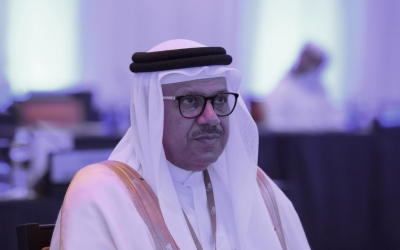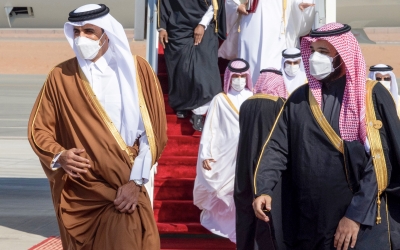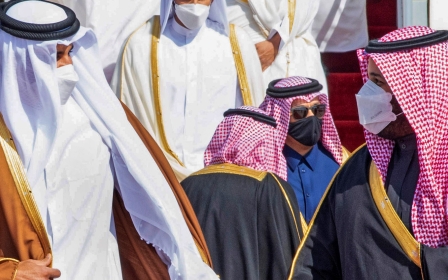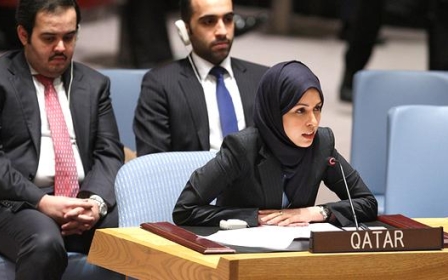The Qatar blockade is over, but tensions with Bahrain are not
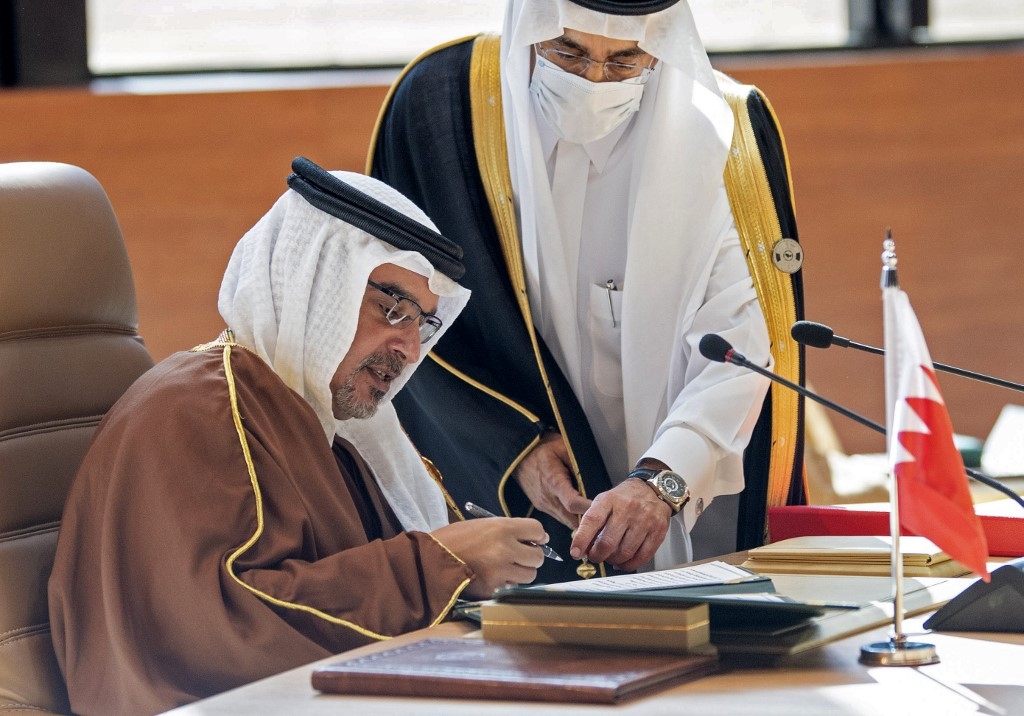
Weeks after Gulf leaders signed a “solidarity and stability” statement in Saudi Arabia ending a three-and-a-half-year blockade on Qatar, Bahrain still does not seem to be completely on board.
Alongside Saudi Arabia, the United Arab Emirates (UAE) and Egypt, Bahrain agreed earlier this month at a summit in the Saudi city of al-Ula to restore full diplomatic, trade and travel ties with Qatar.
The four countries had abruptly cut ties with their neighbour in June 2017, accusing it of being too close to Iran and funding radical movements in the region, charges Doha staunchly denied.
Qataris residing in the four states were subsequently expelled, and Doha was issued with a list of 13 demands to meet in order to end the blockade. These demands included closing the Al Jazeera news network, ending Turkish military presence in Qatar and cutting diplomatic ties with Iran - all of which were turned down.
Since the summit putting an end to the blockade, however, Bahrain has been sending mixed signals.
New MEE newsletter: Jerusalem Dispatch
Sign up to get the latest insights and analysis on Israel-Palestine, alongside Turkey Unpacked and other MEE newsletters
Uncertain travels
The uncertainty over resuming travel between Qatar and Bahrain is perhaps the most telling of these. Travel industry sources in Doha said there is a lack of clarity regarding when they can start booking flights for Manama, Bahrain’s capital, while flights to and from Qatar to Saudi Arabia and the the UAE have resumed.
Bahrain’s civil aviation affairs authority had said the country would open its airspace to Qatar as of 11 January.
Bahraini Foreign Minister Abdullatif al-Zayani also said the kingdom’s relations with Qatar would go back to what they were before 5 June 2017, when travel between the Gulf Cooperation Council (GCC) countries was visa-free for citizens.
Yet bilateral relations took a sharp turn last week when Zayani accused Qatar of not taking “any initiative” to solve its problems with his country.
The minister’s statement followed reports of Qataris being denied entry to Bahrain via the King Fahd Causeway, the only land access between the countries over the sea through Saudi Arabia.
The Qatari government did not respond to the news reports that appeared on two local news websites, including The Doha Globe. The press offices of the Bahraini and Qatari foreign ministries had not replied to Middle East Eye’s request for comment by the time of publication.
In what has been perceived by Qatar as another Bahraini provocation after al-Ula, the Bahraini urban ministry seized 130 properties belonging to the children of Khalid bin Nasser bin Abdulla Al Misnad, the maternal cousins of Qatar’s emir, according to a Doha News report which quoted the Bahraini Official Gazette.
At least four incidents in which Bahrain was accused of trespassing into Qatari territory were reported during the height of the reconciliation efforts before the summit. In three cases, Bahraini fishermen were caught and later released. In December, when Doha accused four Bahraini jets of breaching Qatar’s airspace, Manama called the allegations “baseless”.
‘Intentionally vague’
The recent Bahraini foreign ministry statement accused Qatar of “not making any gesture after the al-Ula summit to resolve the pending issues with Bahrain”. It refers to “pending files” and “the damage” the kingdom has suffered over the last decades as a result of Qatari policies, but does not specify what said files might be.
The statement also accuses Qatar of not responding to an invitation to send an official delegation to Bahrain at the earliest possibility to begin bilateral talks on the pending issues.
“The statements from Bahraini officials were probably intentionally vague so as to not refer to any specific issue, but they do reflect the feeling that the Bahraini leadership was not in favour of ending the rift and was probably forced to follow the Saudi lead in doing so,” Kristian Coates Ulrichsen, a fellow at Rice University’s Baker Institute, told MEE.
He added: “Bahrain and Qatar have had territorial disputes in the past, including the issue of the Hawar Islands, which was resolved in 2001, but which the Bahraini government revived during the period of the blockade.”
The ideological gulf between Doha and Manama was highlighted when Zayani expressed concern over Iran’s nuclear programme, ballistic missiles, and “activities across the Middle East” with Israeli Foreign Minister Gabi Ashkenazi during a virtual conference hosted by Israel’s Institute for National Security Studies on Tuesday.
The UAE’s minister of state for foreign affairs, Anwar Gargash, also participated in the event.
This is in sharp contrast with the Qatari position, as expressed by Foreign Minister Mohammed bin Abdul Rahman al-Thani, that it was time for Gulf countries to enter a dialogue with Iran that Qatar is willing to broker.
“Concerning the current Bahraini resistance to implementing de facto normalisation with Qatar after the al-Ula agreement, I suspect that this may have more to do with the increasing influence over Bahraini decision-making of the UAE, rather than Saudi Arabia,” Justin Gengler, a research associate professor at the Social and Economic Survey Research Institute of Qatar University, told MEE.
Bahrain is the second country in the Gulf, and the fourth in the Arab world, to establish full-scale diplomatic relations with Israel.
However, Qatar is on a different page than its neighbours when it comes to Israel, as it has repeatedly stated its commitment to the Palestinian cause.
“The core of this conflict is about the drastic conditions that the Palestinians are living under: people without a country, living under occupation,” Lolwah al-Khater, Qatar’s foreign ministry spokesperson, asserted in September, when Israeli normalisation reached its peak in the GCC.
Past tensions
But the grudge between the two Gulf countries goes back further than this. Doha and Manama have long fought over the Hawar Islands, a 50-square-km piece of land within one nautical mile of the Qatari mainland and 10 nautical miles from Bahrain. The International Court of Justice ruled in favour of Bahrain in 2001.
In 2011, Bahrain accused Qatar’s Al Jazeera TV of bias in its coverage of the uprising in Bahrain, leading to a diplomatic crisis in August that year, despite Qatar having sent in its military to work under a Saudi-led coalition to quell the protests in Bahrain.
Earlier this month, Bahrain officially criticised Al Jazeera once again for what it described as “baseless” allegations regarding the torture and solitary confinement of jailed Shia Muslim cleric Sheikh Zuhair Jasim Abbas, denying reports of his mistreatment.
Iran heavily factors in Bahrain’s recurring complaints against Qatar.
While all the three erstwhile blockading countries have their specific issues with Tehran, Bahrain’s is an acute one. Over 60 percent of its population are Shia, like the majority of the population in Iran’s Islamic Republic, whereas the ruling family in Bahrain is Sunni.
Before 2014, Qatar had granted citizenship to many Bahraini Sunni Muslims, just when Manama was trying to increase their number as a counterweight to the Shia population.
Bahrain has meanwhile long countered criticism of human rights violations “by vilifying the Shia-led opposition as an Iranian surrogate,” Gengler wrote in Foreign Affairs in 2014.
Saudi-UAE battle for dominance
Bahrain, a small oil producer, has long been dependent on its neighbours, chiefly Saudi Arabia, for its energy needs.
On Monday, Fitch Ratings lead Bahrain analyst Toby Iles said it “will likely need further financial support from its Gulf neighbours despite reform measures”.
This unenviable financial situation may help understanding of Bahrain’s changing loyalty from Saudi Arabia to the UAE. Gengler says this follows substantial Emirati investment in the country in the decade since Bahrain’s 2011 uprising, which Saudi Arabia is in little financial position to offer.
“It is no secret that the UAE came to the Al-Ula summit as a reluctant partner, and I think Bahrain’s continued obstinacy is a message both to Doha and - via Abu Dhabi - to Riyadh,” Gengler said. “I might even go so far as to observe that Bahrain has emerged as a new battleground for Saudi-UAE dominance in the Arabian Peninsula.”
Qatar has not directly responded to the statements of Bahrain. Khater, the foreign ministry spokesperson, said efforts were ongoing to resolve differences between Qatar and neighbouring countries like Bahrain and the UAE.
When asked why the two other countries did not match Saudi Arabia’s enthusiasm in resolving the crisis and why they were reluctant partners, she said: “We want to focus on the positive side. What we saw from Saudi Arabia until now is a very positive sign, and several positive measures followed this.”
Khater added: “If there are media reports about problems between Qatar and some other Gulf states, we are not focused on that and our path forward is to focus on Gulf unity. What we know is that Saudi represents the rest of the GCC countries and so we are not worried about rumours.”
This article is available in French on Middle East Eye French edition.
Middle East Eye delivers independent and unrivalled coverage and analysis of the Middle East, North Africa and beyond. To learn more about republishing this content and the associated fees, please fill out this form. More about MEE can be found here.


